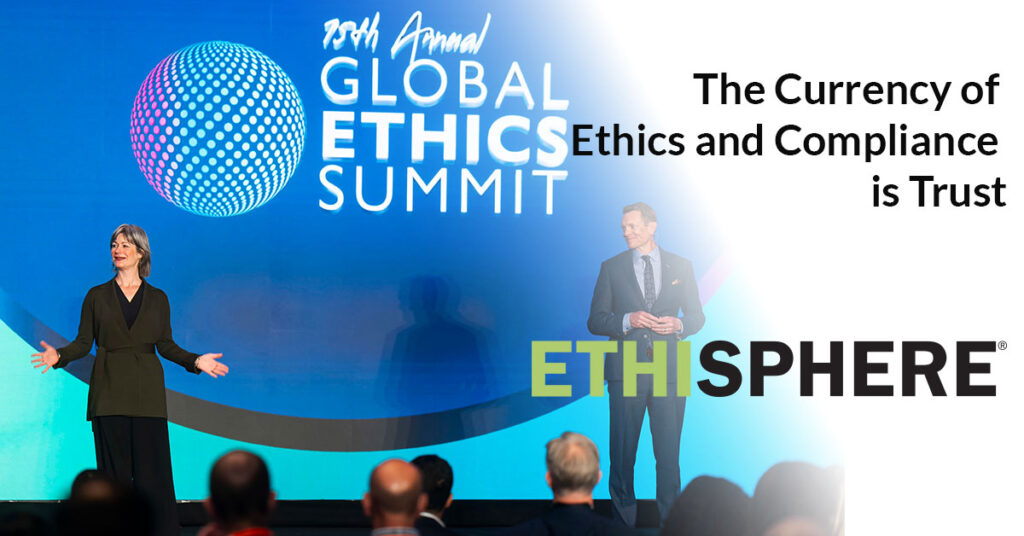Reflections on Ethisphere ‘s 15th Annual Global Ethics Summit—the leading ethics & compliance conference.
This past April, I had the pleasure of kicking off our 15th Global Ethics Summit with my colleague Kevin McCormack. Here at Ethisphere, we think of the ‘year’ as being GES-to-GES, since that is our best opportunity to gather with the thousands of dedicated professionals that make up our ethics & compliance community and live up to the motto of the Business Ethics Leadership Alliance – there is no competition in compliance.
I say it every year, and every year it is somehow true; the team puts together an agenda that is even better than the year before, and this year was no exception. Every panel topic was curated to what we had been hearing since the last GES, and every speaker was fantastic, from the opening session on the Voice of the Chief Compliance Officer, though to the closing session on the Public and Private Partnership to Combat Global Corruption.
I lost track of the number of attendees (online and in person) who commented on how open people were and how willing they were to say what worked – and what didn’t. Since our mark of a successful gathering of BELA is everyone leaves with at least one new friend and some new ideas, here are a handful of my key takeaways from a truly remarkable couple of days:
Reinforce the importance of why, don’t just jump straight to what.
This theme came through in multiple sessions. The kinds of topics we deal with can often be complicated, sometimes verging on esoteric. Always go back to why an issue matters and make sure those who you are asking to address that issue understand the why. Some problems are going to be easier to fix than others, but if you can figure out why something is happening, and why your fix for it will help, it becomes easier to implement the “what”.
Culture is the worst behavior an organization will tolerate.
We held multiple sessions talking about culture, from main stage plenary discussions on the data in our culture set and the importance of transparency to break out sessions on empowering managers, but this culture definition came from my day one conversation with Matt Galvin, Counsel, Compliance & Data Analytics at U.S. Department of Justice. If you start from that definition of culture, and you assume there is no world in which you don’t have problems, then you aim for a world where you identify problems before they metastasize into something bigger. Measuring your culture – identifying the worst behavior your organization will tolerate – gives you a chance to focus your limited resources where they can have the greatest effect.
at U.S. Department of Justice
If you’re using cutting-edge analytics in your sales process, you best believe the DOJ will wonder why your compliance program doesn’t get those too.
Another insight from my conversation with Matt was this nugget. If the company is developing amazing AI enabled sales, and compliance is using baseline spreadsheets, that delta will be noted and will need to be explained. The most mature programs are using data-enabled insights to direct activity and prioritize efforts and are not treating data analytics as an afterthought (or the last element in a presentation to the Department). They use design thinking in the process, so they are not bolting analytics on at the end but instead using data to gain trust across a wide variety of stakeholders.
AI is a tool, and a risk, and it’s here.
Multiple sessions touched on AI, reflecting the ongoing conversations happening across the community on this emerging technology. Speakers encouraged the audience to think about the opportunities it will provide for efficiency as well as the risk it presents (from IP risk to fraud risk and more). And on the risk front, we were also reminded to keep in mind the work of the late Daniel Kahneman, who showed us that we are as susceptible to error as the machines, so stay humble and curious.
The currency of ethics and compliance is trust.
As Melissa Stapleton Barnes in the panel The View from the Boardroom, there is no more relevant control function than E&C to ensure that a company is operating in a way that will build trust and competitive advantage in the marketplace. We saw this point reinforced by Todd Haugh and Suneal Bedi, who presented their findings on the ROI of a compliance program using innovative willingness to pay study techniques to gauge a consumer’s interest in paying more for a product developed by a company with a strong compliance program.
Algonquin Power & Utilities Corporation
Whew. It was a great couple of days, and the beautiful thing about the age we live in now is that the content lives on in BELA Member Hub, so if you missed anything you can revisit it at any time, or request Guest Access. I can’t say yet what will be on that agenda, but I know that the energy, the connections, and the learnings from this GES will be things that will carry us through the rest of this year until we can gather together again.
Save the Date for the 2025 Global Ethics Summit held in Atlanta, GA and online April 6-8.
 5 Minutes - Read Now
5 Minutes - Read Now 







